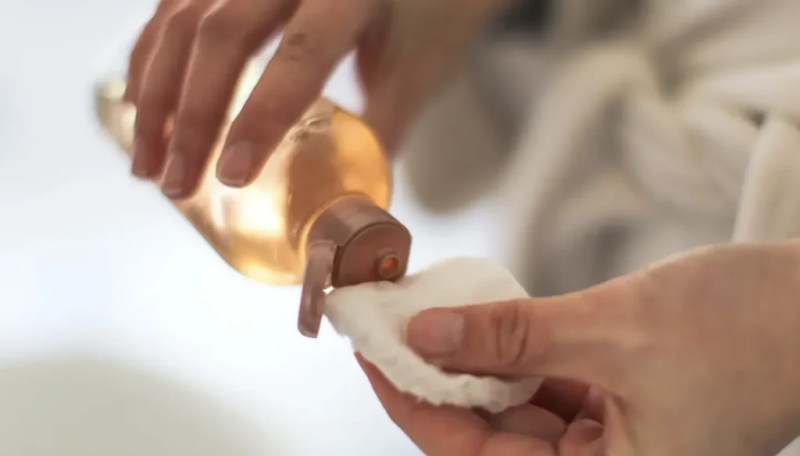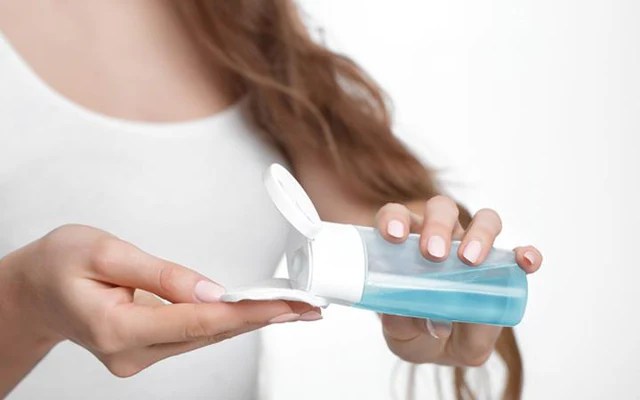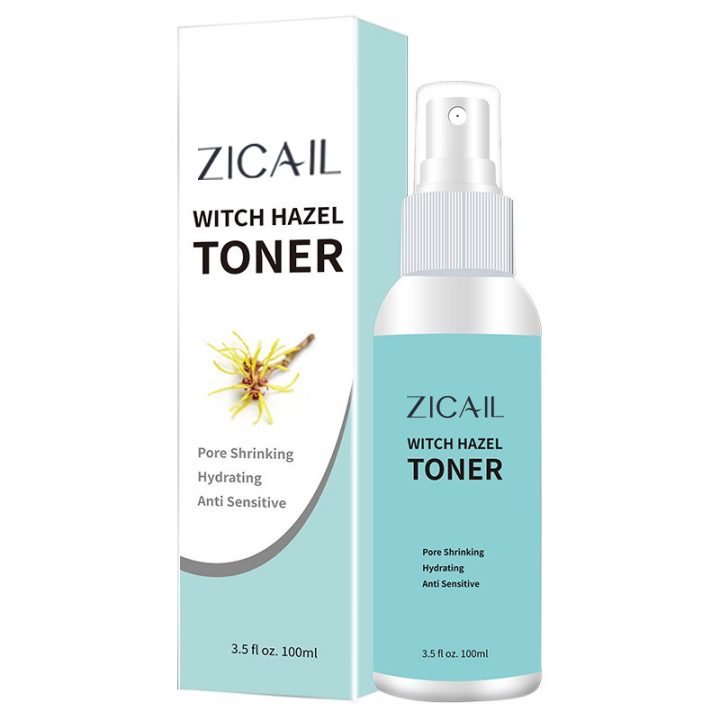Introduction
Toners have become a popular part of many skincare routines. You’ve probably seen them on store shelves or mentioned in beauty blogs. But what exactly do they do?
Toners are used after cleansing your face. They help to remove any leftover dirt, oil, or makeup. They also balance the skin’s pH levels, preparing your skin for moisturizers or serums.
Recently, more people have been using toners every day. It seems like a good idea. After all, if a little is good, more must be better. But daily toner use isn’t always as harmless as it seems.
It can lead to some unexpected problems. Let’s dive into what can happen if you use toner daily and how to avoid those issues.

Understanding Toners: What Do They Do?
Toners play a crucial role in many skincare routines. But what do they do?
At their core, toners are liquids you apply to your skin after cleansing. Their main job is to pick up where your cleanser left off. Even after washing your face, there can still be traces of dirt, oil, or makeup. Toners help remove those last bits, leaving your skin clean and fresh.
But that’s not all. Toners also help balance your skin’s pH levels. Your skin has a natural pH that keeps it healthy. Cleansing can sometimes disrupt this balance, making your skin too alkaline. When this happens, your skin might feel tight, dry, or irritated. Toners help restore the pH balance, making your skin feel more comfortable.
Finally, toners prepare your skin for the next steps in your routine. After using a toner, your skin is better able to absorb moisturizers, serums, or other treatments. This means those products can work more effectively, giving you better results.
In short, toners clean up leftover impurities, balance your skin’s pH, and prepare your skin for the products that follow. They’re a small step but an important one in keeping your skin healthy and glowing.

Common Ingredients in Toners and Their Effects
Toners are made with various ingredients, each serving a specific purpose. Let’s look at some of the most common ones and how they affect your skin.
Learn more about Decoding the Ingredients in Facial Toners.
Alcohol
Alcohol is a frequent ingredient in many toners. It’s known for its ability to remove excess oil and tighten pores. This can be helpful for oily skin.
However, daily use of alcohol-based toners can be harsh. It can strip your skin of its natural oils, leading to dryness and irritation. If your skin feels tight or dry after using a toner, alcohol might be the culprit.
Salicylic Acid
Salicylic acid, a type of beta-hydroxy acid (BHA), is prevalent in toners for acne-prone skin. It helps unclog pores and reduce breakouts. When used daily, it can keep acne under control.
But be careful—salicylic acid can dry, mainly if you use it too often. It’s best suited for oily or acne-prone skin and might be too intense for sensitive skin types.

Glycolic Acid
Glycolic acid is another common ingredient, particularly in exfoliating toners. It’s an alpha-hydroxy acid (AHA) that helps remove dead skin cells and brighten complexions.
Using glycolic acid daily can give your skin a smooth, radiant look. But just like salicylic acid, it can be drying if overused. Daily use may cause irritation or sensitivity, especially if you have dry or sensitive skin.
Learn more about Zicail’s AHA/BHA Toner.
Witch Hazel
Witch hazel is a natural astringent found in many toners. It helps to reduce oil and tighten pores, making it a good choice for oily skin.
Witch hazel also has anti-inflammatory properties, which can soothe the skin. However, some witch hazel products contain alcohol, which can be dried daily. It’s essential to choose a product that suits your skin type. Learn more about Zicail’s Witch Hazel Toner.

Potential Side Effects of Using Toners Every Day
Using toner daily is a good idea, but it can have side effects. Let’s examine what can happen if you are not careful.

Dryness and Dehydration
Toners with alcohol are great at removing excess oil. But here’s the catch: they can also remove too much oil. Your skin needs some natural oils to stay hydrated. Using an alcohol-based toner daily can strip away these oils.
This leaves your skin dry. You might notice your face feels tight or looks flaky. If that happens, it’s a sign that your skin is missing the moisture it needs.
Redness and Irritation
Not all skin types react the same way to toner. If you have sensitive skin, daily use can cause problems. Ingredients like alcohol, salicylic acid, or fragrance can irritate your skin.
This irritation often shows up as redness. Your skin might feel itchy or uncomfortable. If you notice this happening, it’s your skin’s way of telling you it’s had enough. Cutting back on toner or choosing a gentler formula can help.
Peeling and Flaking
Exfoliating toners are famous for removing dead skin cells. They contain ingredients like AHAs (alpha-hydroxy acids) or BHAs (beta-hydroxy acids). These acids are powerful and can make your skin look brighter and smoother.
Learn more about Understanding the Differences Between AHAs and BHAs.
But if you use them every day, you risk over-exfoliating. This can lead to peeling and flaking. Your skin might start to look rough instead of smooth. It’s essential to give your skin a break and avoid overdoing it.
Breakouts and Acne Flare-ups
Toners are often used to control oil and prevent breakouts. But sometimes, using toner too often can have the opposite effect. Your skin might react by producing more oil to compensate for the dryness.
This can lead to clogged pores and more breakouts. If you notice more pimples after using toner daily, it might be time to scale back. Your skin might be telling you it’s too much.
Learn more about Will face creams clog pores if we use them every day?
Increased Sensitivity to Sunlight
Exfoliating toners with AHAs or BHAs can make your skin more sensitive to the sun. These ingredients remove the top layer of dead skin cells, exposing fresh, new skin underneath.
This new skin is more vulnerable to UV rays. You could have a sunburn or long-term sun damage if you’re not careful. It’s crucial to wear sunscreen daily, especially if you’re using these toners regularly.
How to Avoid Side Effects While Using Toner
Using toner can be great for your skin, but doing so is essential. Here’s how to avoid common side effects. Learn more about What is the correct way to apply toner?

Choosing the Right Toner for Your Skin Type
The first step is picking the proper toner. Not all toners are the same, and your skin type plays a significant role in choosing the best one.
- For dry or sensitive skin, look for an alcohol-free toner. Ingredients like aloe vera, chamomile, or glycerin are soothing and hydrating, helping to keep your skin calm and prevent irritation.
- If you have oily or acne-prone skin, a toner with salicylic acid or witch hazel might be better. These ingredients help control oil and keep your pores clear. But remember, even if your skin is oily, you don’t want to dry it out too much, so be careful with toners that contain a lot of alcohol.
- For combination skin, choose a toner that balances moisture without being too harsh. A hydrating toner with mild exfoliants can help keep your skin clear and smooth.
Adjusting Your Routine: Frequency and Application
How often you use toner matters as much as the type you choose.
- If you’re new to using toner, start slow. Try using it once a day, preferably at night. This way, your skin can recover while you sleep.
- If your skin handles it well, gradually increase it to twice daily. But pay attention to how your skin reacts. If you notice dryness or irritation, scale back.
- Application matters, too. Use a cotton pad to apply the toner gently. Avoid rubbing too hard, especially on sensitive areas. You can also use your hands to pat the toner onto your skin, which is gentler and more hydrating.
Learn more about Should I Apply Toner With My Fingers or Cotton?

Moisturizing and Sun Protection: Essential Steps
Toner should never be the last step in your routine. After toning, your skin needs moisture.
- Always follow up with a good facial cream. This locks in the hydration and helps protect your skin’s barrier. Look for a facial cream that suits your skin type—lightweight gels for oily skin, richer creams for dry skin.
- Remember sunscreen, mainly if you use a toner with exfoliating acids like AHAs or BHAs. These ingredients can make your skin more sensitive to the sun. Apply a broad-spectrum SPF 30 or higher every morning, even if you’re staying indoors. Sun protection is critical to avoiding damage and keeping your skin healthy.
By choosing the right toner, using it wisely, and protecting your skin with facial cream and sunscreen, you can enjoy the benefits of toner without the downsides. Your skin will thank you!
Alternative Skincare Practices
If toner isn’t working for you, don’t worry. There are plenty of other ways to keep your skin healthy and glowing. Let’s explore some alternatives.
pH-Balanced Cleansers
One simple switch is to use a pH-balanced cleanser. These cleansers are designed to clean your skin without disrupting its pH. They gently remove dirt, oil, and makeup without stripping away your skin’s moisture.
This can help prevent the dryness and irritation some people experience with toner. A pH-balanced cleanser can be a significant first step in your skincare routine, especially if your skin is sensitive. Learn more about What ph should face cleanser be?

Hydrating Serums
Consider adding a hydrating serum to your routine if your skin feels dry or tight. Serums are lightweight, but they pack a punch for moisture.
Look for serums with ingredients like hyaluronic acid, which draws water into the skin, or glycerin, which helps keep moisture locked in. These serums can give your skin the hydration it needs without risking irritation.
Moisturizing Mists
Another option is to use a moisturizing mist. These sprays are easy to apply and refresh your skin throughout the day. They’re perfect for dry or sensitive skin.
A mist with soothing ingredients like aloe vera or rose water can calm and hydrate your skin. It’s a great way to cool down and refresh your skin, especially in hot weather.
Gentle Exfoliation
If you miss the exfoliating effects of toner, try a gentle exfoliating product instead. Look for something with tiny, smooth beads or a mild acid like lactic acid.
These products can help remove dead skin cells without the harshness of daily toner use. Depending on how your skin reacts, use them once or twice a week.

Non-Irritating Moisturizers
Finally, always have a good moisturizer in your routine. Choose one that’s free from fragrances and harsh chemicals.
Ingredients like ceramides and squalane strengthen the skin’s barrier and keep it soft. A well-moisturized face is less likely to get irritated, even without toner.
Try these alternatives to find a routine that suits your skin. Remember, everyone’s skin is different, so what works for one person might not work for another.
Listen to your skin, and don’t be afraid to adjust your routine. Healthy skin is all about finding what works best for you.
Conclusion
Using toner daily can be good for your skin, but it’s essential to be careful. Knowing your skin type is vital. What works for one person might not work for another. If you have dry or sensitive skin, you might need a gentle toner or use it less often. A more robust toner could be helpful for oily or acne-prone skin, but do what is necessary.
Always listen to your skin. It might be time to change your routine if it feels dry, tight, or irritated. You can adjust how often you use toner or try a different product. Your skin will tell you what it needs if you pay attention.
Related Reading
Can face toner remove dark spots?
Decoding the Ingredients in Facial Toners
What Does Facial Toner Do and How to Use it
Can I use toner and sunscreen only?
What is the difference between a toner and a serum?






